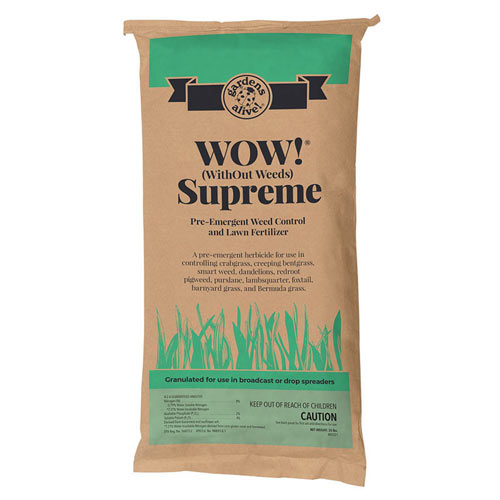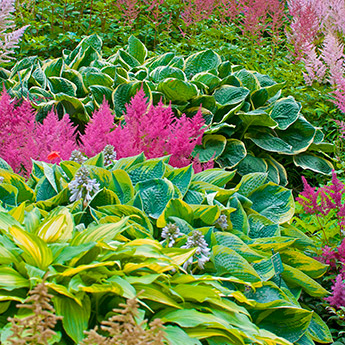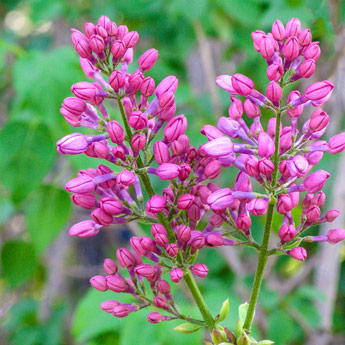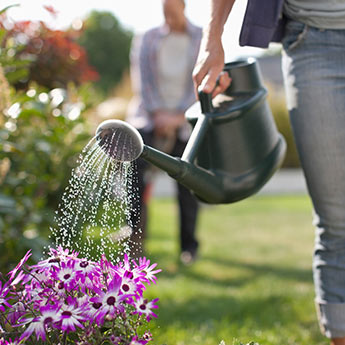Preen Herbicide: What is Preen and is it Safe?
-
Helpful Products from Gardens Alive!
-
 WOW!® Supreme™ Pre-Emergent Weed Control & Lawn Fertilizer
WOW!® Supreme™ Pre-Emergent Weed Control & Lawn Fertilizer
The Not-So-Wonderful World of Herbicides
Q. Linda writes: "We moved to the Eastern Shore of Maryland about three years ago. I have a question about fireflies and other important organisms that reside here: Will Herbicides mess up the natural balance of their habitat? We live on about four acres, part of which is a brackish pond behind our house. We have nice landscape beds and trees that need mulching every year or two. This is the first year we are paying someone to do it. They mentioned using Preen and I immediately said no. I would like to know if Preen is harmful and what alternative I can use."
A. You don't say what kind of mulch you have, but wood mulches can be extremely problematic, with dyed mulch being the absolute worst. Those dyes could be disguising the fact that the original material included construction debris, arsenic and creosote pressure-treated wood, and/or insecticide-soaked pallets. I hope that you're using pine straw or pine fines instead. The preferred mulch for down South, pine straw is attractive, prevents weeds, retains soil moisture and doesn't breed the nasty fungal spores that love to colonize shredded wood.
Now--on to Preen. "Preen" is a company name and not a specific item, but most of their products are pre-emergent chemical herbicides, sometimes combined with chemical plant food to make "weed and feed". Although they do offer one product for vegetable gardens, the majority of their market is in lawn care. If your mulchers aren't being paid to take care of the lawn its safe to assume that they want to sprinkle Preen on the mulch to prevent future weed growth. It's important to remember that pre-emergent herbicides only prevent seeds from sprouting; they have no effect on existing weeds.) Unless the mulch was contaminated with lots of weed seeds, it would seem to be a waste of time--and an invitation to ecological danger.
The most common ingredient in Preen products is an herbicide known as Trifluralin ("try-floor-a-Lynn"). Wiki tells us that fourteen million pounds of the stuff is applied to American landscapes every season--and that it's been banned for use in the European Union since 2004 because of its devastating effects on marine life. The package for one Trifluralin product ("Preen Extended Weed Control") contains the warning: "This product is extremely toxic to [all forms of fish, including freshwater, ocean-going, and species that live in Estuaries]. (Note: I'm paraphrasing here because the original label language is fairly impenetrable.)
A different product ("Preen Lawn Weed Control") carries the same cautions about fish and amphibian kills--but the first listed active ingredient on this one is the notorious 2,4-D--one of the ingredients used in the infamous "Agent Orange" herbicide used to destroy the jungles of Vietnam. As we speak, tens of thousands of Vietnam vets are finally on the verge of being compensated for cancers related to their exposure to that Witches Brew of herbicides. Several medical and epidemiological studies also link 2,4-D to very specific cancers--especially non-Hodgkin's lymphoma in male dogs and agricultural workers.
The labels warn that is illegal to use these products on vegetable gardens; and the "Extended Weed Control" also warns against using it on lawns. But the one allowed for use on lawns is the one that contains 2,4-D--the herbicide directly linked to cancers in male dogs. Come on!
(I should mention that Preen does market one non-lethal pre-emergent: "Preen Natural Weed Preventer", which contains 100% corn gluten meal.)
Because Preen's chemical herbicides have been shown to kill fish and amphibians--as have the Round-up family of products--they are forbidden for use near water. And with Linda's property being on the notoriously high-water table of the Eastern Shore AND containing a pond, it would be especially tragic for her to use chemical herbicides; she'd be killing the frogs and toads that do an amazing job of pest control. And the fireflies she mentions breed in wet areas; herbicides certainly won't do them any good. Dragonflies also breed in water--some species spend years living in water in their larval form--and adult dragonflies are the best controller of the mosquitoes that plague the Eastern Shore in the summer.
So thank you, Linda, for 'just saying no'; you live in a fragile (and wonderfully diverse) ecosystem; and one of the best ways to keep it healthy is to avoid the use of all toxic pesticides; especially herbicides, which cause the most damage in wet environments.
Now--alternatives? Depends on the problem. If these workers are concerned about weeds growing in the mulch, they could apply corn gluten meal without any harm to the environment--but weeds generally aren't a problem in mulch. The best defense against weeds in lawns is to keep the grass healthy with a three-inch-high cut, a super-sharp blade and clippings returned to the turf. For the occasional job of spot weeding, nothing beats a mix of hand-weeding and use of the original herbicide--it's called a hoe.
There are many types of hoes--my favorites include the Winged Weeder (which has a triangular head with super-sharp edges) and the Winged Weeder Jr.--same shape and sharpness, but smaller, for precisely slicing of weeds growing right next to desired plants. I also like the Collinear hoe--it has a small super-sharp blade that's rectangular--and replaceable! Look sharp; stay sharp!
Q. Linda writes: "We moved to the Eastern Shore of Maryland about three years ago. I have a question about fireflies and other important organisms that reside here: Will Herbicides mess up the natural balance of their habitat? We live on about four acres, part of which is a brackish pond behind our house. We have nice landscape beds and trees that need mulching every year or two. This is the first year we are paying someone to do it. They mentioned using Preen and I immediately said no. I would like to know if Preen is harmful and what alternative I can use."
A. You don't say what kind of mulch you have, but wood mulches can be extremely problematic, with dyed mulch being the absolute worst. Those dyes could be disguising the fact that the original material included construction debris, arsenic and creosote pressure-treated wood, and/or insecticide-soaked pallets. I hope that you're using pine straw or pine fines instead. The preferred mulch for down South, pine straw is attractive, prevents weeds, retains soil moisture and doesn't breed the nasty fungal spores that love to colonize shredded wood.
Now--on to Preen. "Preen" is a company name and not a specific item, but most of their products are pre-emergent chemical herbicides, sometimes combined with chemical plant food to make "weed and feed". Although they do offer one product for vegetable gardens, the majority of their market is in lawn care. If your mulchers aren't being paid to take care of the lawn its safe to assume that they want to sprinkle Preen on the mulch to prevent future weed growth. It's important to remember that pre-emergent herbicides only prevent seeds from sprouting; they have no effect on existing weeds.) Unless the mulch was contaminated with lots of weed seeds, it would seem to be a waste of time--and an invitation to ecological danger.
The most common ingredient in Preen products is an herbicide known as Trifluralin ("try-floor-a-Lynn"). Wiki tells us that fourteen million pounds of the stuff is applied to American landscapes every season--and that it's been banned for use in the European Union since 2004 because of its devastating effects on marine life. The package for one Trifluralin product ("Preen Extended Weed Control") contains the warning: "This product is extremely toxic to [all forms of fish, including freshwater, ocean-going, and species that live in Estuaries]. (Note: I'm paraphrasing here because the original label language is fairly impenetrable.)
A different product ("Preen Lawn Weed Control") carries the same cautions about fish and amphibian kills--but the first listed active ingredient on this one is the notorious 2,4-D--one of the ingredients used in the infamous "Agent Orange" herbicide used to destroy the jungles of Vietnam. As we speak, tens of thousands of Vietnam vets are finally on the verge of being compensated for cancers related to their exposure to that Witches Brew of herbicides. Several medical and epidemiological studies also link 2,4-D to very specific cancers--especially non-Hodgkin's lymphoma in male dogs and agricultural workers.
The labels warn that is illegal to use these products on vegetable gardens; and the "Extended Weed Control" also warns against using it on lawns. But the one allowed for use on lawns is the one that contains 2,4-D--the herbicide directly linked to cancers in male dogs. Come on!
(I should mention that Preen does market one non-lethal pre-emergent: "Preen Natural Weed Preventer", which contains 100% corn gluten meal.)
Because Preen's chemical herbicides have been shown to kill fish and amphibians--as have the Round-up family of products--they are forbidden for use near water. And with Linda's property being on the notoriously high-water table of the Eastern Shore AND containing a pond, it would be especially tragic for her to use chemical herbicides; she'd be killing the frogs and toads that do an amazing job of pest control. And the fireflies she mentions breed in wet areas; herbicides certainly won't do them any good. Dragonflies also breed in water--some species spend years living in water in their larval form--and adult dragonflies are the best controller of the mosquitoes that plague the Eastern Shore in the summer.
So thank you, Linda, for 'just saying no'; you live in a fragile (and wonderfully diverse) ecosystem; and one of the best ways to keep it healthy is to avoid the use of all toxic pesticides; especially herbicides, which cause the most damage in wet environments.
Now--alternatives? Depends on the problem. If these workers are concerned about weeds growing in the mulch, they could apply corn gluten meal without any harm to the environment--but weeds generally aren't a problem in mulch. The best defense against weeds in lawns is to keep the grass healthy with a three-inch-high cut, a super-sharp blade and clippings returned to the turf. For the occasional job of spot weeding, nothing beats a mix of hand-weeding and use of the original herbicide--it's called a hoe.
There are many types of hoes--my favorites include the Winged Weeder (which has a triangular head with super-sharp edges) and the Winged Weeder Jr.--same shape and sharpness, but smaller, for precisely slicing of weeds growing right next to desired plants. I also like the Collinear hoe--it has a small super-sharp blade that's rectangular--and replaceable! Look sharp; stay sharp!
-
Helpful Products from Gardens Alive!
-
 WOW!® Supreme™ Pre-Emergent Weed Control & Lawn Fertilizer
WOW!® Supreme™ Pre-Emergent Weed Control & Lawn Fertilizer







 Gardens Alive! & Supplies
Gardens Alive! & Supplies




